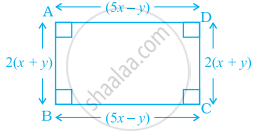Advertisements
Advertisements
प्रश्न
The sum of first n natural numbers is given by `1/2n^2 + 1/2n`. Find the sum of first 11 natural numbers.
उत्तर
Given, sum of first n natural numbers = `1/2n^2 + 1/2n`
Sum of first 11 natural numbers = `1/2(11)^2 + 1/2(11)` ......[Put n = 11]
= `1/2 xx 121 + 11/2`
= `121/2 + 11/2`
= `132/2`
= 66
APPEARS IN
संबंधित प्रश्न
Write down the following in the product form: 6y5
If 11 is subtracted from 4 times a number, the result is 89. Find the number.
Find a number which when multiplied by 5 is increased by 80.
The sum of three consecutive natural numbers is 114. Find the numbers.
When Raju multiplies a certain number by 17 and adds 4 to the product, he gets 225. Find that number.
One out of two numbers is thrice the other. If their sum is 124, find the numbers.
The sum of three consecutive odd numbers is 21. Find the numbers.
The perimeter of the triangle shown in the figure is ______.
The diameter of a circle is a line which joins two points on the circle and also passed through the centre of the circle. (In the adjoining figure AB is a diameter of the circle; C is its centre.) Express the diameter of the circle (d) in terms of its radius (r).

The side length of the top of square table is x. The expression for perimeter is ______.
The expression for the number of diagonals that we can make from one vertex of a n sided polygon is ______.
Find the perimeter of the figure given below:

In a rectangular plot, 5 square flower beds of side (x + 2) metres each have been laid (see the figure). Find the total cost of fencing the flower beds at the cost of ₹ 50 per 100 metres:

A wire is (7x – 3) metres long. A length of (3x – 4) metres is cut for use. Now, answer the following questions:
- How much wire is left?
- If this left out wire is used for making an equilateral triangle. What is the length of each side of the triangle so formed?
The sum of the multiplication table of natural number ‘n’ is given by 55 × n. Find the sum of table of 10.
If ![]() = 2x + 3,
= 2x + 3, ![]() = `3/2x + 7` and
= `3/2x + 7` and ![]() = x – 3 then find the value of:
= x – 3 then find the value of:
2![]() +
+ ![]() –
– ![]()
Write an expression for the sum of 1 and twice a number n. If you let n be any odd number, will the result always be an odd number?
